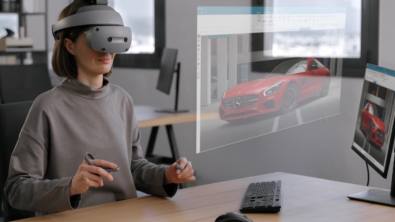Building smarter systems with agentic AI

Artificial intelligence is finding a place across tools and process at every stage of the design and manufacturing process but, as its capabilities continue to grow, it’s applications will expand from singular improvements to broad, industry-spanning, changes. With its ability to span varied data types and learn complex tools, AI is uniquely poised to span the design process in a way neither traditional software nor human experts can.
In a recent podcast, guests Boris Scharinger, Senior Innovation Manager and Technology Strategist for Siemens Digital Industries, and Dr. Justin Hodges, Senior AI/ML Technical Specialist in Product Management for Siemens Digital Industries Software looked ahead to examine the broader impact of AI across breadth of a products lifecycle, from conception to completion.
Check out the full episode here or keep reading for some of the highlights from that conversation.
Applying AI across applications
AI is already making significant changes in some specific areas and, from that, broader trends are starting to emerge. To start this conversation, Justin highlights three key applications of AI that span across systems and industries which will, going forward, significantly change every step of the industrial value chain.
- AI supported decision making offers a massive speed boost to everything from picking an optimal design to diagnosing a malfunctioning machine. Thanks to its unparalleled data processing abilities, AI can quickly connect disparate information to draw meaningful conclusions to help users make the right decisions.
- AI can also accelerate innovation. Through a different application of decision support, AI can accelerate the process of finding new solutions as well. By examining all possible factors, an AI model could do everything from enhance design space exploration to come up with novel factory layouts.
- LLMs will reimagine human/machine communication, making information, tools and insights accessible in a way that was never possible before. This will further break down the barriers that exist between complex, digital, systems and creative human thinking.
The future with agentic AI
Beyond these applications, Boris notes the impact that agent-based or agentic AI systems will have in the future. Currently, most applications and systems are interfaced with by APIs, which have rigid requirements and capabilities that must be explicitly hard-coded into any other application that is interfacing with them. A powerful LLM, however, could interface with tools on the fly, quickly creating AI agents to process data, interact with systems and more without the need for highly explicit interfaces.
In the future, current model-based system engineering (MBSE) practices will be enhanced by AI to become agent-based engineering and design approaches supported by LLM technology, Boris continues. Using specialized AI agents to handle different aspects of the design process, with each one orchestrated by an overarching LLM system that helps interpret human input into completed designs. Combining agentic AI, LLMs and the industrial metaverse will create a next-generation perspective on MBSE as a means of mastering complexity. While achieving such a connected and convenient system still has many hurdles to overcome, the building blocks already exist and are being actively developed today.
Working toward this future also allows companies to extract greater value from their existing data, something that will be key in not only achieving better design results, but also in improving the tools and making them more user friendly. All together this will shift the way products are designed and manufactured, creating a greater emphasis on usability and sustainability then is possible today, all through the intelligent leveraging of existing data.
As AI continues to develop, it will move beyond simply enhancing existing processes to instead redefine the norm for the way products are designed, tested and manufactured. Adopting a data-driven design and manufacturing process will allow companies to leverage data and support sustainability goals in ways that weren’t possible before, all thanks to the unparalleled data-processing power of AI.
To find out more, check out the full podcast here.
Siemens Digital Industries Software helps organizations of all sizes digitally transform using software, hardware and services from the Siemens Xcelerator business platform. Siemens’ software and the comprehensive digital twin enable companies to optimize their design, engineering and manufacturing processes to turn today’s ideas into the sustainable products of the future. From chips to entire systems, from product to process, across all industries. Siemens Digital Industries Software – Accelerating transformation.


